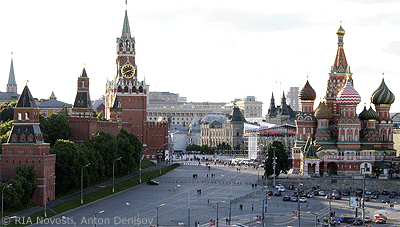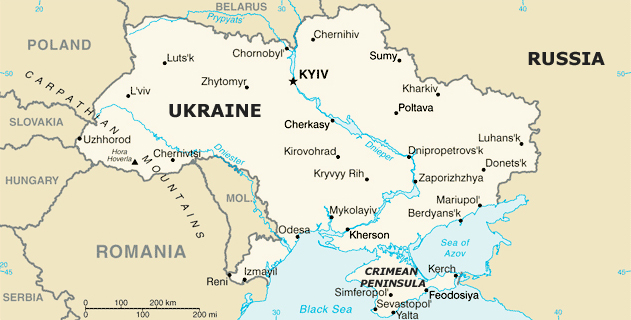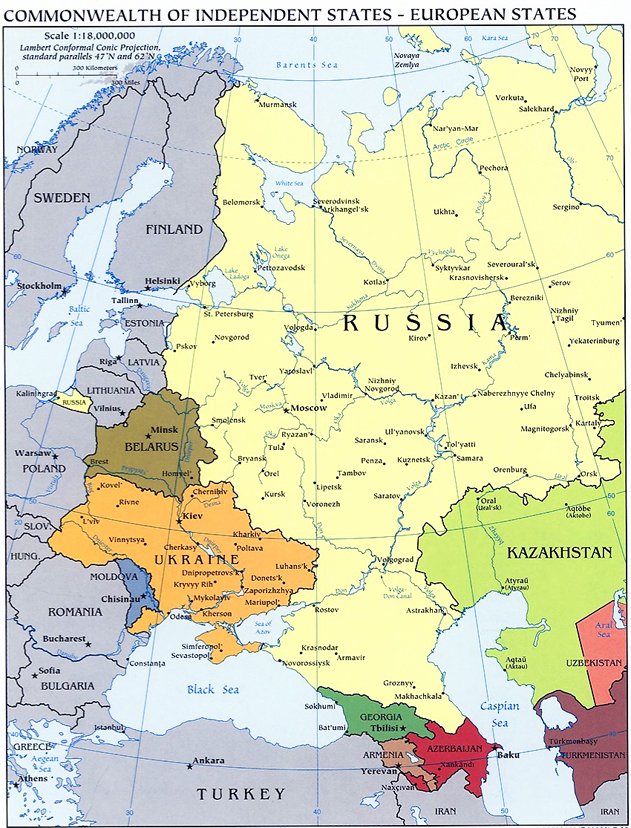Putin Hovering on the Brink of a Massive Invasion of Ukraine

(Eurasia Daily Monitor: Volume 11, Issue 73 – Pavel Felgenhauer – Jamestown Foundation – jamestown.org – April 17, 2014)
The Ukrainian crisis and the “reunification” of Crimea with the rest of Russia dominated President Vladimir Putin’s almost four-hour-long televised national phone-in-an annual PR performance that had been previously dominated by discussion of pensions, utility payments, inflation, wages and other internal “bread and butter” issues. Putin vigorously defended the decision to “reunify Crimea with Russia,” insisting all the members of Russia’s Security Council “fully supported [his] plan of action that was executed swiftly and professionally.” Russia, according to Putin, “did not plan to annex Crimea,” but sent in its troops to support a local referendum to join Russia and to defend the Russians in Crimea from threats by extreme Ukrainian nationalists after the government of President Viktor Yanukovych in Kyiv was overthrown in an “illegal coup.” Putin acknowledged that Russian regular troops took over Crimea and paved the way to “reunifying Crimea.” However, Putin insisted there are today no Russian troops or special forces in eastern and southern Ukraine, where heavily armed pro-Russian activists are currently taking over administrative buildings, police headquarters, military bases, airports and other strategic targets in more or less the same operational pattern as in Crimea (http://www.kremlin.ru/news/20796).
Putin and other Russian officials have been blaming the West for instigating the Ukrainian crisis and, as Putin put it, “Pushing us too far, so we were forced to push back.” In his televised phone-in, Putin insisted the threat of the North Atlantic Treaty Organization’s (NATO) expansion engulfing Ukraine, the possibility of Western (NATO) military bases and offensive armaments “appearing in Crimea,” as well as “NATO ships in Sevastopol” forced Moscow’s hand in deciding to take over Crimea. According to Putin, not only Crimea, but the entirety of eastern and southern Ukraine, from Kharkiv in the northeast to Odessa on the border with Romania and Moldova, comprise “Novorossia” or “New Russia”-a region conquered at the end of the 18th century by Tsarina Catherine the Great and given to Ukraine by the Bolsheviks in the 1920s. Putin implied N ovorossia does not belong to Ukraine and must return to the Russian homeland. Putin once again repeated that Ukrainians and Russians “are one nation temporarily divided into two states” (http://www.kremlin.ru/news/20796).
The unification of Crimea is supported by over 90 percent of Russians, and a relentless TV PR campaign is effectively keeping the population in a state of patriotic frenzy (http://wciom.ru/index.php?id=459&uid=114766). Next month, on May 10, already signed and approved legislation will be enacted, which will make any public calls for the “dismantlement of the Russian Federation” officially “separatism” and a felony, punishable by up to five years in prison. In effect, calling Crimea “occupied” or Ukrainian would be a criminal offence. Foreigners or Russians making such statements in any media in any jurisdiction could be prosecuted (http://www.kremlin.ru/news/20796).
The Russian Ministry of Foreign Affairs denounced an official United Nations r eport on human rights in Ukraine as a “one-sided and falsified fabrication” because it did not find that Russians or Russian-speakers in Crimea or southeastern Ukraine were victims of any targeted repression (http://www.mid.ru/brp_4.nsf/newsline/0381FD1EEE097F0244257CBB0059B500). The Russian permanent representative at the UN, Vitaly Churkin, used strong language to condemn the West and the UN. According to Churkin, pro-Russian civilians in eastern and southern Ukraine have volunteered to act as “human shields” to prevent Ukrainian military and security forces from acting against armed pro-Russian fighters. Churkin accused Western “emissaries visiting Kyiv” of provoking strife and bloodshed. The Russian ambassador also talked about “unknown gunmen in black fatigues-not Ukrainian military”-who have been deployed against pro-Russian separatists (http://www.rg.ru/2014/04/17/churkin-site.html).
The notion that armed agents of the United States are directly involved in clashes in Ukraine is becoming an important theme of Kremlin propaganda. The surprise visit by Central Intelligence Agency (CIA) director John Brennan to Kyiv last weekend has been interpreted in Moscow as evidence of Washington pulling the strings behind the scenes in the Ukrainian crisis. According to Alexei Pushkov, the chairman of the Duma Foreign Relations Committee, “the Brennan visit is evidence the US has installed a puppet regime in Kyiv” (http://www.vz.ru/news/2014/4/15/682158.html). A Kremlin-financed site has quoted a Russian Security Council source implying Brennan had gone to Kyiv to try to locate some 20 American contract solders from a private military contracting organization that have gone missing in action in the Donetsk region (http://www.vz.ru/news/2014/4/15/682084.html). Previously, the Russian foreign ministry accused a US private military contracting organization, Graystone Ltd., of deploying some 150 contract fighters in Ukraine, masquerading as Ukrainian special for ces “to unleash a civil war” (https://www.facebook.com/MIDRussia/posts/475475109218602). The Ukrainian authorities have accused the Russian military of deploying its special forces in Ukraine to foment trouble and have claimed to have arrested ten such agents (http://www.rbc.ua/rus/news/accidents/sbu-zaderzhala-10-agentov-rossiyskoy-razvedki-17042014123000).
During the televised phone-in, Putin reiterated Moscow’s “right” to use Russian military force in any part of Ukraine: “I remind you that the Russian Federation Council [the upper chamber of Russia’s parliament] has given the president the right to use the armed forces in Ukraine.” But he expressed hope that the “Ukrainian problems will be solved by political and diplomatic means” (http://www.kremlin.ru/news/20796). A massive invasion of eastern and southern Ukraine is a high-risk endeavor and Putin seems to be hovering on the brink of giving orders to go in, still hoping his main strategic objectives may be achieved w ith less cost. At a meeting on April 17, in Geneva, the negotiating parties of Russia, the US, the European Union and Ukraine have agreed to de-escalate the Ukraine crisis, calling for all illegal armed groups to disarm and leave the occupied buildings. A wide amnesty must be announced, a nationwide constitutional process must begin and observers from the Organization for Security and Cooperation in Europe (OSCE) must help ensure compliance (http://www.interfax.ru/world/372402).
The Geneva agreement is good news, but will it hold? The Kremlin wants changes in the Ukrainian constitution that would recognize pro-Russian forces as being in full control of eastern and southern Ukraine and having veto power over the central government in Kyiv. Any national elections in Ukraine must be “legitimate”-which means they must produce a result that Moscow likes. And most importantly, the new “legitimate” authorities in Kyiv must officially recognize the annexation of Crimea, effectively ending any Western sanctions or threat of sanctions (http://www.interfax.ru/world/372402). Any result that falls short of those demands would most likely be only a temporary reprieve from the threat of war. During the phone-in, Putin repeated several times that European countries had only “limited sovereignty” because they surrendered it to Washington by becoming NATO members (http://www.kremlin.ru/news/20796). Apparently Putin believes Ukraine and the other countries in Russia’s sphere of influence can also only be allowed limited sovereignty because, in Moscow’s view, without that concession, there cannot be any permanent crisis solution.


